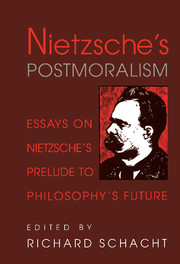Book contents
- Frontmatter
- Contents
- Contributors
- Preface
- A Note on References
- Introduction
- Nietzsche on the Illusions of Everyday Experience
- Masters without Substance
- Rethinking the Subject: Or, How One Becomes-Other Than What One Is
- The Youngest Virtue
- Morality as Psychology, Psychology as Morality: Nietzsche, Eros, and Clumsy Lovers
- On the Rejection of Morality: Bernard Williams's Debt to Nietzsche
- Nietzsche's Virtues: A Personal Inquiry
- Nietzschean Normativity
- Nietzsche's Perfectionism: A Reading of Schopenhauer as Educator
- Bibliography
On the Rejection of Morality: Bernard Williams's Debt to Nietzsche
Published online by Cambridge University Press: 20 May 2010
- Frontmatter
- Contents
- Contributors
- Preface
- A Note on References
- Introduction
- Nietzsche on the Illusions of Everyday Experience
- Masters without Substance
- Rethinking the Subject: Or, How One Becomes-Other Than What One Is
- The Youngest Virtue
- Morality as Psychology, Psychology as Morality: Nietzsche, Eros, and Clumsy Lovers
- On the Rejection of Morality: Bernard Williams's Debt to Nietzsche
- Nietzsche's Virtues: A Personal Inquiry
- Nietzschean Normativity
- Nietzsche's Perfectionism: A Reading of Schopenhauer as Educator
- Bibliography
Summary
That there is some connection between Bernard Williams's views on morality and Nietzsche's has long seemed clear. The most obvious point of comparison is that both thinkers are opponents of morality. Nietzsche presents himself as an “immoralist” – a term he claims for himself as a “symbol and badge of honor,” one that “distinguishes [him] from the whole of humanity” (EH IV:6). Although Williams makes no comparable claim for himself, his abolitionist stance toward morality is suggested by the title of the final chapter of his 1985 Ethics and the Limits of Philosophy – “Morality, the Peculiar Institution” – which applies to morality the epithet given to slavery in the antebellum South. What has not been so clear is whether Williams's reasons for advocating the abolition of morality are indebted to Nietzsche's, or even very similar to them. The debt and similarity may seem minimal at best. After all, Williams's tone and vocabulary for talking about morality and his focus on moral obligation place him squarely in the tradition of English moral philosophy, which seems far removed from Nietzsche's concerns. And the most obvious debt of his critique of morality is to Elizabeth Anscombe. This suggests that, far from drawing his objections to morality from Nietzschean sources, Williams may not even be using “morality” to refer to the same thing that Nietzsche's immoralism rejects.
- Type
- Chapter
- Information
- Nietzsche's PostmoralismEssays on Nietzsche's Prelude to Philosophy's Future, pp. 100 - 122Publisher: Cambridge University PressPrint publication year: 2000
- 6
- Cited by



